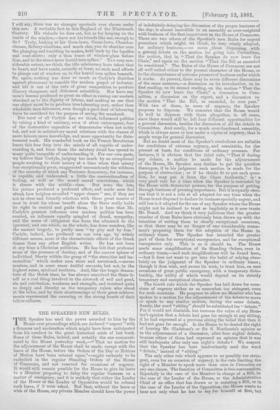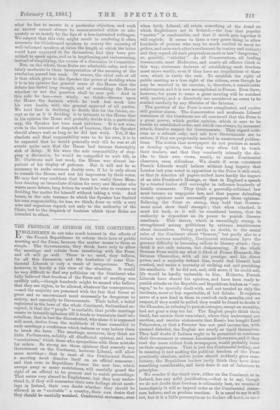THE SPEAKER'S NEW RULES.
THE Speaker has used the power accorded to him by the House over proceedings which are declared " urgent " with a firmness and moderation which might have been anticipated from his conduct in the great historical crisis of last week. Some of these Rules, indeed, and notably the one communi- cated to the House yesterday week,—" That no motion for the adjournment of the House shall be made, except with the leave of the House, before the Orders of the Day or Notices of Motion have been entered upon,"—ought certainly to be embodied in the regular Standing Orders of the House of Commons, and not reserved for occasions of urgency. It would still remain possible for the House to give its leave to a Member proposing to delay the regular business on a matter of emergency, and it is unlikely that either the Leader of the House or the Leader of Opposition would be refused such leave, if it were asked. But that, without the leave or wish of the House, any private Member should have the power of indefinitely delaying the discussion of the prcper business of the day, is almost incredible in an assembly so over-weighted. with business of the first importance as the House of Commons. There are two others of the Speaker's new Rules for urgent procedure which might, we think, be very wisely adopted, for ordinary business,—we mean ,those dispensing with a general debate on the motion for going into Committee, the motion, that is, " That the Speaker do now leave the Chair," and again on the motion "That the Bill as amended. be considered." The Rules of the House of Commons are not all well suited either to the present character of the House, or to the circumstances of extreme pressure of business under which it works. At present, there may be seven different discussions of the same measure,—a discussion on its introduction, on its first reading, on its second reading, on the motion "That the Speaker do now leave the Chair," a discussion in Com- mittee, a discussion on the report, and a discussion on the motion "That the Bill, as amended, do now pass." With two of these, in cases of urgency, the Speaker proposes to dispense. We conceive that the House would. do well to dispense with them altogether, in all cases, since there would still be left four different opportunities for a general discussion, besides the discussion of all the details in Committee. And surely, for a much over-burdened assembly, which is always more or less under a regime of urgency, that is ample verge for general discussion.
But no doubt most of the Speaker's resolutions are suitable for conditions of extreme urgency, and unsuitable, for the present at least, for conditions of ordinary pressure. For instance, it is obvious that the third rule, " That if during any debate, a motion be made for the adjournment of the House, Mr. Speaker may decline to put the question thereupon, if in his judgment such motion is made for the purpose of obstruction ; or if he thinks fit to put such ques- tion, ho may put it from the Chair forthwith," is a very good rule for a time when the Speaker is entrusted by the House with dictatorial powers, for the purpose of getting through business of pressing importance. But it is equally obvi- ous that it is not a rule at all adapted for any time when the House is not disposed to declare its business specially urgent, and still less is it adapted for the use of any Speaker whom the House might not be inclined to trust as implicitly as it now trusts Mr. Brand. And we think it very judicious that the greater number of these Rules have obviously been drawn up with the intention of suiting them to clearly exceptional occasions, so that there may be no danger of any considerable states- man's proposing them for the adoption of the House in ordinary times. The Speaker has intended the greater part of them for exceptional emergencies, and for exceptional emergencies only. This is as it should be. The House needs some simplification of its Standing Orders, even in ordinary times,—and such simplifications will be found here, —but it does not want to get into the habit of relying abso- lutely on the judgment of the Speaker in ordinary times ; though it does wish, and avows its wish, to trust him, on rare occasions of great public emergency, with a temporary dicta- torship, the utility of which would depend on its strictly temporary and exceptional character.
The fourth rule which the Speaker has laid down for occa- sions of urgency strikes us as somewhat too stringent, even
for such occasions. He proposes to allow no Member who has
spoken to a motion for the adjournment of the debate to move or speak to any similar motion, during the same debate.
Surely, the word "sitting" should be substituted for " debate."
For it would not diminish, but increase the value of any Mem- ber's opinion that a debate had gone far enough at any sitting, if he had expressed at a previous sitting the belief that then it had not gone far enough. Is the House to he denied the right of hearing Mr. Gladstone's or Sir S. Northcote's opinion as to the adjournment of a discussion, after four nights' debate, because either of them had expressed an opinion that it was still inadequate after only one night's debate, Wo suspect that the Speaker has here inadvertently used the word. "debate," instead of " sitting."
The only other rule which appears to us possibly too strin- gent, even for an occasion of urgency, is the rule limiting the right of a Member to speak more than once in Committee on any one clause. The function of Committee is free conversation. Especially in the case of the Member in charge of a Bill, the case of the Leader of the House, or the Administrative Chief of an office that has drawn or is resisting a Bill, or in the case of the Leader of the Opposition, the House wants to hear not only what he has to say for himself at first, but what he has to answer to a particular objection, and such an answer cannot always be communicated either so ade- quately or so tersely by the lips of a less instructed colleague. We suspect that this rule might result in rendering it often necessary for ill-informed speakers to convey the meaning of well-informed speakers at twice the length at which the latter could have conveyed it for themselves, had they been per- mitted to speak again, and so in lengthening and embarrassing, instead of simplifying, the course of a discussion in Committee.
But, on the whole, these Rules are admirable rules, and cer- tainly moderate in their interpretation of the meaning of the resolution passed last week. Of course, the chief rule of all is that which gives to the Speaker the power of deciding when it is in his opinion the general sense of the House that the debate has lasted long enough, and of consulting the House whether or not the question shall be now put. And in this rule he has—very wisely, we think—thrown upon the House the decision which he took last week into his own hands, with the general approval of all parties. We hold that in declining to decide this for the future, ex- cept so far as it is deciding it to intimate to the House that in his opinion the House will probably decide it in a particular way, the Speaker has been most judicious. It is not wise, even in the interests of despatch of business, that the Speaker should always wait so long as ho did last week. Yet, if the absolute and final responsibility were to be his own, it is to be expected that he would generally wait till he was at all events quite sure that the House had become thoroughly sick of delay. If his were the sole responsibility of stop- ping a discussion, he would be compelled to wait till, as Mr. Gladstone said last week, the House was almost im- patient of his display of patience. But it will not be so necessary to make sureness doubly sure, if he is only about to consult the House, and test his impression by their votes. He may feel very confident that there are really three Mem- bers desiring an immediate division for every one Member who wants more debate, long before he would be wise to venture on deciding the matter for himself without taking a vote. And hence, in the sole instance in which the Speaker has limited his own responsibility, he has, we think, done so with a very wise and sagacious regard, not only to the authority of the Chair, but to the despatch of business which these Rules are intended to effect.



































 Previous page
Previous page